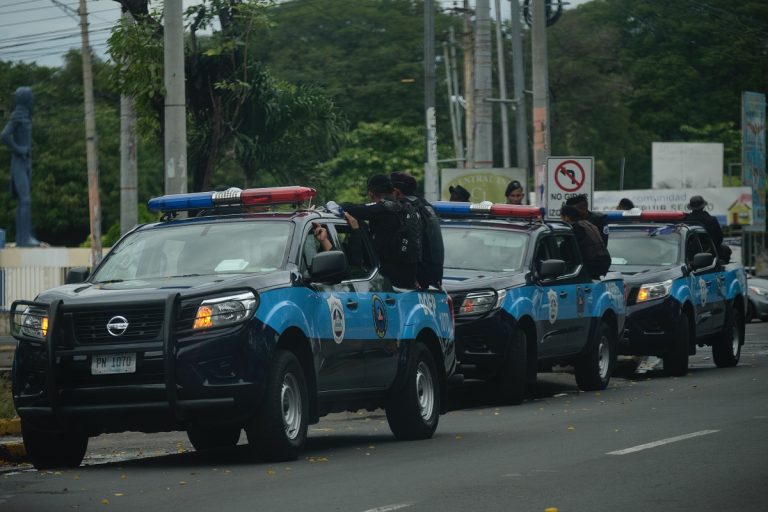5 de mayo 2021

Children of Exile: The Births “Sowing Hope” in the Camp of Nicaraguan Farmers

PUBLICIDAD 1M
PUBLICIDAD 4D
PUBLICIDAD 5D
UN rapporteur and Inter-American Commission for Human Rights warn of the negative impact of restrictions on Nicaraguans’ political rights

UN rapporteur and Inter-American Commission for Human Rights warn of the negative impact of restrictions on Nicaraguans’ political rights
Clement Voule of the UN called on the Ortega regime to “fully guarantee the right to peaceful assembly.” Voule is the United Nations Special Rapporteur on the Rights to Freedom of Peaceful Assembly and of Association. His call comes during the run-up to the call for general elections in Nicaragua. For two and a half years, the government of Daniel Ortega and Rosario Murillo has prohibited all types of opposition activities.
Voule issued his call during an interview with the Race and Equality Institute. He stated that the restrictions imposed by the regime since September 2018, “are undermining the right to peaceful assembly. That’s one of the fundamental rights in any free and meaningful electoral process.”
In the opinion of the UN official, maintaining international attention to the human rights situation in Nicaragua “is fundamental”. “We’re observing some serious restrictions to the civic and democratic spaces, including attacks, harassment and threats.” This “is even more relevant for guaranteeing free, equitable and transparent elections in November 2021,” he warned.
Along the same lines, Voule manifested his intention to visit Nicaragua once the COVID-19 public health emergency has been overcome. He’s interested in observing “first hand, issues related to promoting and protecting the rights to free and peaceful assembly and association. That includes the efforts realized, and the challenges that remain.”
Voule plans to continue appealing to the government to suspend the Law for the Regulation of Foreign Agents and the Special Cybercrimes Law. Both laws have a negative impact on the right to free association. In addition, they provoke the closure of civic organizations that decide not to submit to them.
“To date, we haven’t received any response from the government,” Voule indicated. “One of the most serious concerns is the “Foreign Agents” Law. This law prohibits those classified as “foreign agents” from “intervening in matters, activities, or topics of internal politics. There is, however, no clear definition for these terms. This broad prohibition violates not only the right to free association, but also the rights of political participation, free expression and peaceful assembly,” he added.
Meanwhile, Antonia Urrejola, president of the Inter-American Commission for Human Rights (IACHR), pointed out that this electoral year in Nicaragua will be “predictively difficult”. That’s clear, given the laws passed between the end of 2020 and the beginning of 2021. “We’ll keep a close watch on the day-to-day developments. We’re prepared to publicly denounce any violations of rights, and to take the protective measures indicated.” Urrejola made these comments during an interview with the Race and Equality Institute.
She recalled the resolution approved last year by the Organization of American States General Assembly. This resolution demanded the passage of needed electoral reforms for the realization of “free and fair” elections in Nicaragua. For their part, the IACHR pointed out at the beginning of 2018, “the lack of independence and neutrality of the Supreme Electoral Council”. They considered this “one of the factors affecting the situation in Nicaragua.”
“The IACHR has remained abreast of these matters and will be very attentive to the course of this election year. There are also human rights standards on political rights that should be respected. This continues to be an area where the Nicaraguan government should undertake institutional modification to assure free and fair elections,” explained Urrejola.
The IACHR president also indicated that she’d continue promoting human rights in the country. “Impunity and injustice must not be perpetuated,” she added.
Meanwhile, human rights advocates Marlin Sierra of the Nicaraguan Center for Human Rights (Cenidh) and Lottie Cunningham of the Atlantic Coast Center for Justice and Human Rights (Cejudhcan) both issued denunciations. They stated that the Ortega regime has accused these NGOs of conspiring against the state. As a result of these baseless accusations, presented without evidence, the administrative and bureaucratic barriers against them have been formalized.
Sierra stated that the current legislation in Nicaragua has the objective of “creating an extremely restrictive environment. They aim to limit the work of defending human rights, and to significantly reduce such activities. In this way, they accentuate the state of terror that already exists in the country.” In December 2018, Cenidh was arbitrarily stripped of its legal status and suffered the illegal confiscation of its property.
Cunningham, of the Atlantic Coast center, noted that cancelling organizations’ legal status has been only the most visible expression of government violations. It hasn’t, however, been the only violation of freedom of association. “Other dispositions and negligent actions have also been denounced. These have reduced the organizations’ margins of operation.
“[The organizations] have found it impossible to access the required documentation. This has been the consequence of a delay on the part of the state authorities in issuing the corresponding certificates. (…) Later, they impose fines, generating greater expense for the associations,” the human rights advocate declared.
Archivado como:
PUBLICIDAD 3M
Confidencial es un diario digital nicaragüense, de formato multimedia, fundado por Carlos F. Chamorro en junio de 1996.
PUBLICIDAD 3D